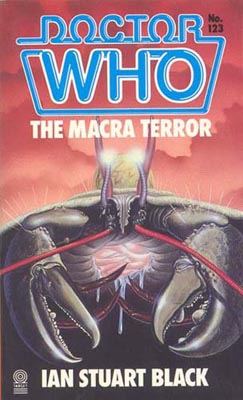The Macra Terror
Doctor Who - The Macra Terror

|
The Macra Terror |
Target novelisation Doctor Who - The Macra Terror |

|
| Author | Ian Stuart Black |  |
| Published | 1987 | |
| ISBN | 0 426 20307 0 | |
| First Edition Cover | Tony Masero |
| Back cover blurb: In the far future a group of humans is living an idyllic existence on a distant planet. Their colony is run like a gigantic holiday camp and nothing seems to trouble their carefree existence. When one of them claims that the colony is being invaded by hideous monsters, no one takes him seriously. But the Doctor's suspicions are immediately aroused. What is the terrible menace that lurks at the heart of this apparent paradise? Why are the colonists unaware of the danger that lies before their very eyes? And what is the Macra Terror? |
There's no such thing as Macra by Andrew Feryok 27/4/14
The Controller continued, "Programme One: Control must always be believed and obeyed. Programme Two: There is no such thing as Macra men. No such thing as Macra men. No such thing as Macra men..."The Macra Terror is the very definition of "forgotten gem" in the halls of Doctor Who. The story is immensely strong and is arguably the point where the entire Troughton era finally came together to give us what we would recognize as the Second Doctor and his particular style of story. While there are many Troughton stories that I would love returned, The Macra Terror is definitely one of the few I have secretly harbored a longing for its return. Even with no surviving episodes, just listening to the audio or reading the photonovel you immediately realize that this is an exciting and cerebral story... with giant crabs! Only Doctor Who could get away with a bizarre idea like that!
- The Controller giving instructions to the Colony, The Macra Terror, Page 51, Chapter 4
Ian Stuart Black penned the novelization of his TV script for Target Books and didn't really stray at all from the story. In fact, you could argue that this reads like a bad Terrance Dicks novelization with virtually no deviations from the original story, and a prose style that is fast and structured like a script. But somehow, Black's prose style never quite feels like you are reading a script. He alters the story just enough so that it flows like a book rather than a script. It also helps that the story is so strong that even a weak novelization is carried along by just how brilliant the source material is, not unlike Terrance Dick's novelizations of The Deadly Assassin and The Caves of Androzani. Plus, given the fact that no episodes survive from this story, most readers will be largely unfamiliar with the story anyway. As a result, unless the episodes are recovered in the future, this is the closest we will come to reading the story as a whole entity.
Black does alter the story here and there though. One of the biggest changes is that he allows the character of Medok to live! In the original TV episode, Medok is killed by the Macra when he follows Jamie into the forbidden areas of the mines. In the book, the Macra doesn't have the strength from lack of gas to kill him and so he is able to escape. He doesn't show up again until the very end of the story when he witnesses the TARDIS dematerializing. Ben's recovery from the Macra mind control isn't played up as much as it is on TV and Ben just suddenly shows up cured to save his friends at the eleventh hour. Also, the original TV episode opened with Medok interrupting the colony celebrations with his ravings of monsters, and this was followed by the TARDIS landing and the time travelers stepping out to explore. In the book, we open with a whole new TARDIS scene before that links the events from The Moonbase to this story, although the use of the time scanner is not mentioned and instead the Doctor explains the image as a piece of space interference picked up by the scanner while passing through space.
On the whole, a very enjoyable novelization of a forgotten classic of the Troughton era. It may not do anything brilliantly original with its story the way William Emms did with Galaxy Four or Donald Cotton with The Myth Makers, but it is a quick and exciting read that transports you back to the magic of the Troughton era. Definitely worth checking out even if you are unfamiliar with it.